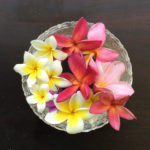“…a moment of enlightenment is a moment when we realize the blessings that are always pouring forth.” Nyoshul Khenpo
7 AM. The morning traffic races past; streets are full, the markets are bustling. Days literally burst forth loud and early in Bali. Birds sing; roosters crow, dogs scrabble with each other and eagerly poop on the sidewalk. Shop awnings creak open, vendors push and call. I walk, weaving among screeching motorbikes and buses, school children crashing through on bicycles, gym classes already in the soccer field, women offering fruits or teas or spices, taxi drivers out and calling, eager for work. At this hour, the morning air is still cool; in just a bit it will be stifling, sauna-like, and it will become a chore to even move.
It would be easy for the senses to be overwhelmed with so many sights and sounds and smells and human encounters. I wonder at how to have ease – joy, even – with all of this tangled sensory data? This: today’s version of the impermanent, out-of-personal control, messy and ever flowing river of life. Asking this in my morning Bali walk is not so different from the questions of my life back home in the US, with its raging political and social conflicts. I am invited to develop wise and skillful attention – both internally and externally – as daily life bombards my senses, my body aches and ages, emotions erupt, the mind spins.
The Buddha speaks of so very many ways of working with this. There is mindfulness, attention: not to abstractions but to the sensations of the present moment: “It’s like this now.” I practice knowing discernment, interest, delight, restraint, avoidance, patient tolerance.
From a strictly biological perspective, however, I can get out of balance. I can attend unwisely to so many things that my nervous system becomes overloaded and depleted and I fall out of coherence; I can become caught in biological responses of fight or flight or freeze and lose the capacity for wholesome attention. It sounds not unlike, I think, the state that Siddhartha found himself in when, having practiced extremes of asceticism, he found that he was near mental overwhelm and physical death and he was no longer able to even attend wisely. He recognized the limitation of those extremes and, decided to no longer be afraid of the pleasure that has nothing to do with unskillfulness. When Sujata offered the ordinary nourishment of rice milk, he opened to simply receive. More balanced, his ability to bring appropriate attention returned.
Similarly, Anagarika Munindra, when asked why he meditated, is said to have replied, “I practice meditation to notice the small purple flowers growing by the roadside, which I might otherwise miss.” He wasn’t proposing, I think, that the wise attention of meditation would bring only happy sensual pleasures which he could keep for himself, to which he could cling, and which would then last. He was proposing that appropriate attention would bring about an ease, a gladness and tranquility of heart, which, in turn, would allow ever deeper untangling of the causes of suffering for himself and others.
Still, I can struggle in confusion, when I encounter the classical Buddhist teachings on indulgence, on the very real limitations of sensory pleasure, on clinging, and letting go. Misunderstood, it can seem that delight in the beauty and wonder of life is to be shunned. The issue, though, is always whether or not any contact, any movement, any thought or word or action leads to continued suffering or to its end. Is this delight leading to an increase in clinging? Is it inviting me to land in solidity and greed and self-centered holding on? Or is it – even a bit – a turning toward the mystery and wholesome goodness of non-separation, kindness, compassion and joy?
So, it is important that I not neglect the Buddha’s teachings on goodness, on joy and blessings. In the Mangala Sutta, he lists, for my contemplation, dozens of ”highest blessings,” including honorable friends, wholesome occupation, and my own virtues. Remember these, he instructs; contemplate them. Open to know all goodness, even the mundane goodness of everyday life. Like Siddhartha, I too can open to attend in a wise and balanced way to the nourishment that inclines me toward freedom. I can question: Is this delight one that leads to the further suffering of clinging and self-absorption, or is it inclining my mind and heart toward vastness, toward mystery, toward release?
When I go out in the Bali mornings, even in the midst of all of the chaos, I practice simply opening to the happiness of what is precious. Beauty, joy, kindness, gladness is everywhere; there are heart connections to it all, even the scrambling dogs and the screeching traffic. There are flowers that, through the night, have fallen from the lush trees onto the roads and walkways. I gather them into my arms before they are swept away. Opening to receive their soft loveliness, brings an ease to my heart. It is a good way to nourish and orient my day. I carry them back to my residence here. Though they quickly are gone forever, their momentary beauty reminds and feeds me. It is good. This, too, is appropriate attention.
everywhere; there are heart connections to it all, even the scrambling dogs and the screeching traffic. There are flowers that, through the night, have fallen from the lush trees onto the roads and walkways. I gather them into my arms before they are swept away. Opening to receive their soft loveliness, brings an ease to my heart. It is a good way to nourish and orient my day. I carry them back to my residence here. Though they quickly are gone forever, their momentary beauty reminds and feeds me. It is good. This, too, is appropriate attention.
